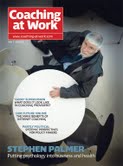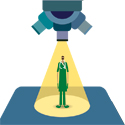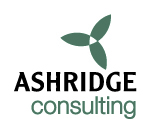Welcome to the November 2012 issue of the newsletterI’ve just returned from the annual European Mentoring & Coaching Council’s conference in Bilbao in Spain, home to one of the Guggenheim museums. I was struck by how architect Frank Gehry has succeeded in creating a structure which is innovative and surprising yet which blends in beautifully with its environment- from the shallow moat which gives the impression it is part of the river, to the many curves and sheets of metal which reflect light and the structure’s surroundings. Within its walls are numerous galleries including one exhibiting Egon Schiele- further pockets of creativity and innovation. The whole experience seems a perfect metaphor for business coaching. Rather than one-off interventions with no regard for the wider system, we should be seeking to bring about beautiful and meaningful co creations with the individual or group client, which at the same time artfully integrate and add value to the environment and culture in which they arise. We include a conference report in the January issue of the magazine. Talking of paintings, Rachel Ellison explored in an earlier issue how looking at paintings can help leaders and their coaches move to new ways of seeing. See article – the art of coaching. And at the Academy of Executive’s annual conference in London, John Leary Joyce drew parallels between tango and coaching – see Stop Press. There was exciting news at the EMCC conference- the EMCC has formed an alliance with the International Coach Federation and the Association for Coaching (see News Online). Our own conference is on 2 July 2013 in London. Subscribers are eligible for a discount to this and all our events (the last two conferences sold out weeks before). In addition, subscribers receive either the digital magazine, or the printed and the digital version of the magazine. We publish six magazine issues a year; 16 newsletters (including four mentoring digests) and subscription also includes registration on our global Coach List; additional online content; access to every issue since 2005, and a global LinkedIn group (at last count we had more than 12,000 members). See a sample issue here Liz Hall, Editor, Coaching at Work, Winner of the Association for Coaching Award for Impacting (Leadership/External Focus) Service to the Wider Community for 2010–11
Let’s get connectedFollow us on Twitter athttp://twitter.com/CoachatWorkmag http://twitter.com/lizhallcoaching Join our global Coaching at Work Linkedin group athttp://www.linkedin.com/groups?mostPopular=&gid=2274910 Coach listHave you joined our coach list yet? or if you’re a buyer, have you used the list to help you find the coach/coaches you need? you can now upload a coaching at work coach listing member logo onto your website, emails and so on to show you’ve been approved. Go to: Sample our contentYou have to be a subscriber to access most of the articles on Coaching at Work website. However, you can now view a whole issue here: New online formatSubscribers to the magazine can now read it, and earlier content in a Calameo format, allowing you to “flick through” the magazine online. Do be patient when you’re downloading the magazine- it can take up to 20 seconds or so. See back issues in this new format: http://www.coaching-at-work.com/2012/01/20/back-issues-2/ There is also some freely available content on the website, including the following:
|
|
 |
More Highlights of the October issue of the magazine
Supervised behaviour Research by Sam Humphrey and Louise Sheppard into supervision requirements. See here. Toolbox: Diversity Awareness Ladder This tool by David Clutterbuck helps clients understand and work with their stereotypes and implicit biases. See here. Health coaching toolkit- part 4 Stephen Palmer expands on cognitive behavioural health coaching. This issue: cognitive thinking skills. See here.
|
ASHRIDGE ConsultingBecome a fully accredited coach The Ashridge Masters in Executive Coaching is part-time over two years. Develop reflective inquiry into your own professional practice. Join now! Programmes start December 2012 and February 2013 Full details are online www . ashridge . org . uk/amec or contact jensigne.molbeckblyth@ashridge.org.uk |
 |
Running matePoliticians come from all walks of life and get little training for their complex, often combative, decision-making roles. Systemic coaching can bring clarity, argues Elke Esders. See here. |
 |
Quality assuredAgainst the backdrop of sweeping changes in the NHS, clients are reporting increased ability to manage organisational change, among other benefits, according to ongoing evaluation, say Sue Mortlock and Alison Carter. See here. |
 |
High anxietyShowing anxious clients how to reframe their negative self beliefs, by Dr Trish Riddell. See here. |
Stop PressMentoring re-offendersMentors should meet offenders as they leave prison to help them escape lives of crime, according to the UK’s Justice Secretary Chris Grayling. Under plans unveiled this month (November), mentoring is to be rolled out by voluntary groups and private companies on a payment-by-results basis. Prime minister David Cameron has called for a “rehabilitation revolution” offering the majority of prisoners help in breaking the cycle of reoffending. Currently only those who are jailed for more than a year are given rehabilitation. Let’s tangoBoth tango and coaching offer a structure which does not constrict and which liberates creativity, suggested John Leary-Joyce. He led delegates at the Academy of Executive Coaching’s (AoEC) conference through a series of tango dances to explore the coaching relationship, the nature of leading and following, and the dynamics of collaboration and team coaching. He invited delegates to look at the structure of both through the following lenses: form; connection; dynamics; grounded-ness and creativity; technique and tools, and flow.” On connection, he said:” How do we find that sensitivity and awareness to build the quality of connection? At the AoEC, we talk about relationship as the fundamental change point so we need to be clear and direct, yet sensitive and inviting in our interventions.” On flow, he said: “You need to let go of techniques and tools: there comes a point when you have to give up what’s learnt. The notion of being in the moment is very central to my whole background.” EMCC gathers internal coaching dataAs the coaching industry matures, internal coaching/mentoring is growing at a faster rate, as reports from Ridler and the Chartered Institute of Personnel and Development have confirmed. Against this backdrop, the EMCC is looking to enhance understanding of this arena. The body has approached a number of academic institutions to ascertain what research on internal coaching/mentoring already exists, and will be sharing it with members. The aim is to help new insights emerge, and to grow appreciation of the subject for the benefit of internal coaches/mentors, sponsors, organisations and those who experience internal coaching and mentoring. This is a potentially rich area of the coaching and mentoring industry to explore, perhaps even more so because it is so strongly driven by organisational context and culture. If you would like to know more or share your research in this space, contact Sara Hope at sara@theinternalcoach.com. The largest ever coaching researchNearly 1500 people have responded to a study coordinated by Ashridge, meaning the study has already achieved its aim of being the largest ever coaching study. However the researchers are still hoping for more responses from coaches and clients. Data collection will stay open for another three months. Ask your new clients to complete the short client questionnaire on www.ashridge.org.uk/client. Background information is on www.ashridge.org.uk/centreforcoaching. News OnlineEMCC, AC and ICF form an allianceBy Liz Hall In a landmark move for the coaching industry worldwide, three of its leading professional bodies have formed a global alliance. |
|
Diary datesDecember 6-7 December: Birmingham BPS SGCP Annual Conference. www.bps.org.uk/SGCP2012 10-14 December: London 2013 2 July: London Coaching at Work’s annual conference |
|

The Centre for Coaching, London UKThe Centre for Coaching, International Academy for Professional Development Ltd runs a range of Middlesex University Accredited and Association for Coaching recognised modular coaching courses at Levels 5, 6 & 7. The 5-day Certificate in Coaching (Level 5, 15 Credits) is an introductory Cognitive Behavioural coaching programme. Other courses include the 5-day Certificate in Psychological Coaching (Level 6, 15 Credits), the modular 6-day Certificate in Stress Management and Performance Coaching (Level 5, 30 Credits) and the Certificate in Coaching Psychology (Level 7, 20 Credits). The Diploma courses are at graduate and postgraduate levels. Special 15% discount offer extended to Coaching at Work magazine subscribers who enrol for our courses during November and December, 2012. Call Dawn Cope for further details: Tel: +44 (0) 208 318 4448 or Peter Ruddell: 0845 680 20 65 Click here for: Course dates; Course Brochure. Email: Dawn Cope Courses can also be run in-house for organisations. Tel: +44 (0) 208 318 4448 or 0845 680 20 65 |
If you want to advertise your organisation here, please contact Kate Thomas for more details.

